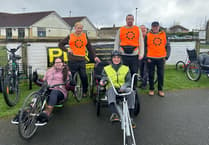The Royal United Hospitals Bath NHS Foundation Trust is the first research centre in the country to study how a new device could potentially reduce the risk of blood clots in stroke patients.
Researchers want to find out if the geko™ medical device can reduce the risk of blood clots in people who are now less mobile as a result of a stroke.
The geko™ device is a similar size to a watch strap. It is fitted to a patient’s leg, just below the knee, and uses a small electrical pulse to stimulate a nerve in the leg, which causes muscle contraction and increases blood flow in the leg.
News of the new study, funded by the National Institute for Health and Care Research (NIHR), coincides with World Stroke Day, a national campaign held in October each year to increase awareness and action of stroke prevention around the world.
Hayley Stoney, RUH Stroke Research Nurse, said: “We’re really proud to be the first centre in the country to be leading on such an important study.
“People who have had a stroke will often have reduced mobility as a result and this can increase the risk of them getting potentially fatal blood clots in their legs.“We want to assess if the geko™ device is suitable for our stroke patients and, if it is, whether it could reduce their chances of getting blood clots.”
Patients are eligible to take part in the study if they have had a stroke within 36 hours of symptoms beginning.
All patients involved in the study will have a compression Doppler ultrasound of both legs at day seven and fourteen, to detect if they have any asymptomatic blood clots.
The study is sponsored by Firstkind LTD.
The FAST test can help you recognise the most common signs of a stroke.
- Facial weakness: Can the person smile? Has their mouth or eye drooped?
- Arm weakness: Can the person raise both arms?
- Speech problems: Can the person speak clearly and understand what you say?
- Time to call 999: if you see any of these signs.
Other research studies currently taking place at the RUH focusing on improving theunderstanding and treatment of strokes include:
- The Predicting Language Outcome and Recovery After Stroke (PLORAS) study, run by University College London (UCL), aims to help clinicians predict how soon after a stroke a patient might be able to recover their speech and language ability. The study looks at scans of stroke patients' brains to identify which area of the brain has been affected and, alongside patient questionnaires, aims to more accurately predict when patients may be able to speak again.
- The PhEAST study aims to help stroke patients who are unable to swallow food and drink to re-train their brain so that they can swallow independently again. The study uses special nasal gastric tubes, which are used to feed patients, fitted with tiny electrodes. The electrodes are used to deliver short bursts of current directly to the muscles and nerves that are used for swallowing. It is hoped that by stimulating these nerves, the electric current will help to re-programme the swallowing centres in the brain.
If you could help with the PLORAS study, please email [email protected] or call 01225 824120.
You can find out more about RUH's research into strokes on their website.
For more information about NIHR and its research work, visit: https://www.nihr.ac.uk/




